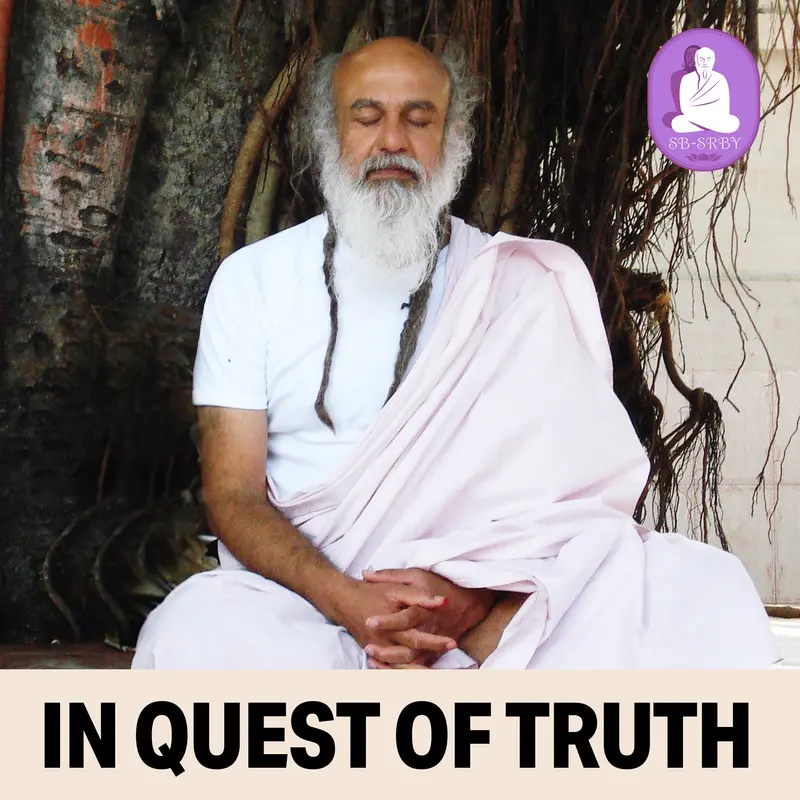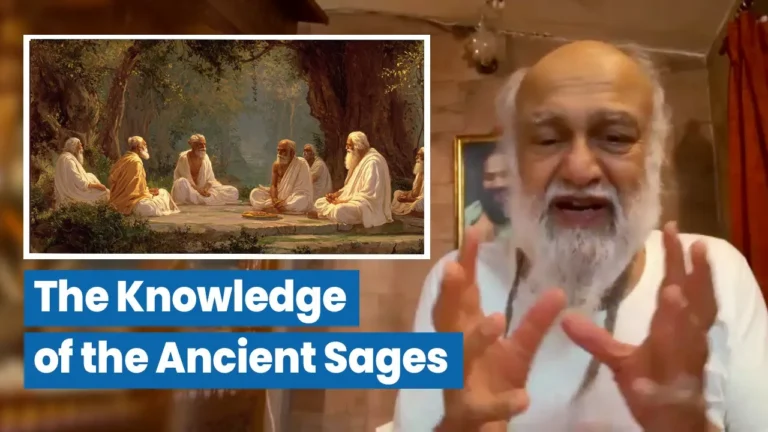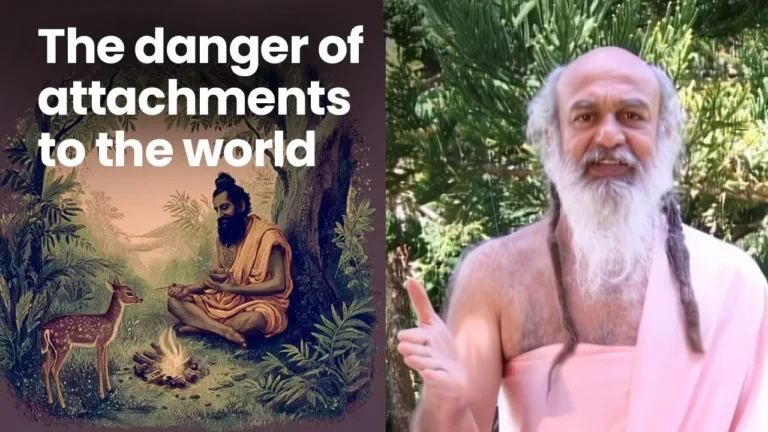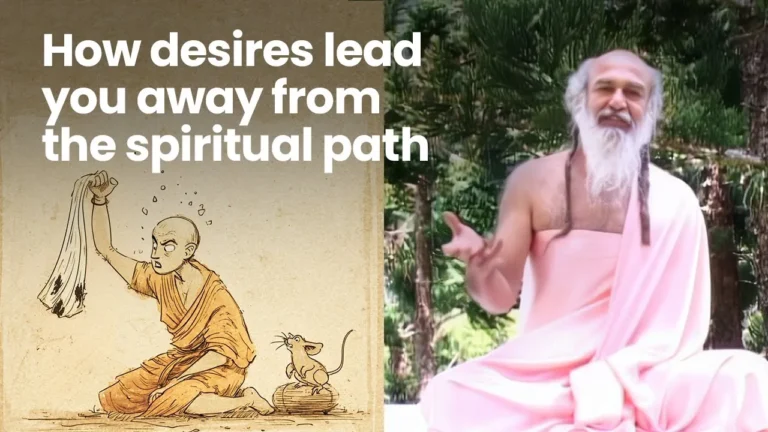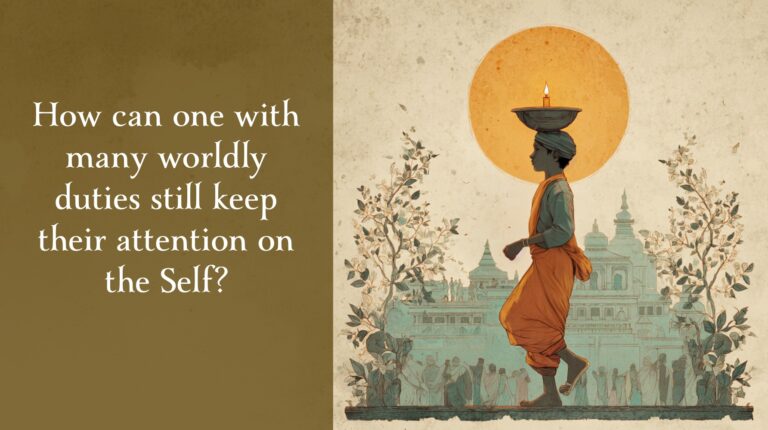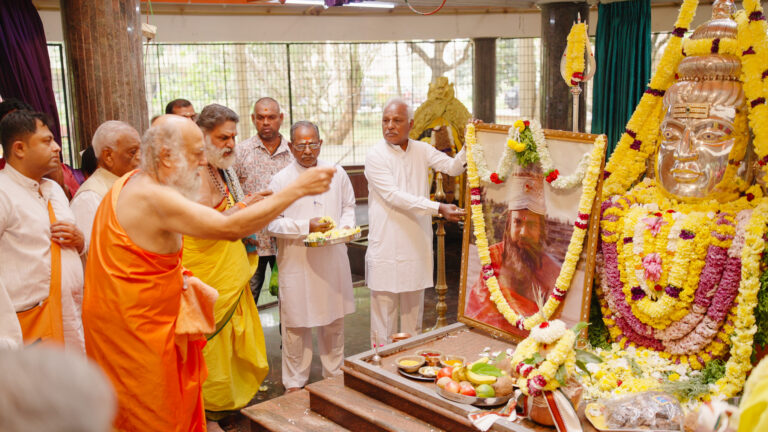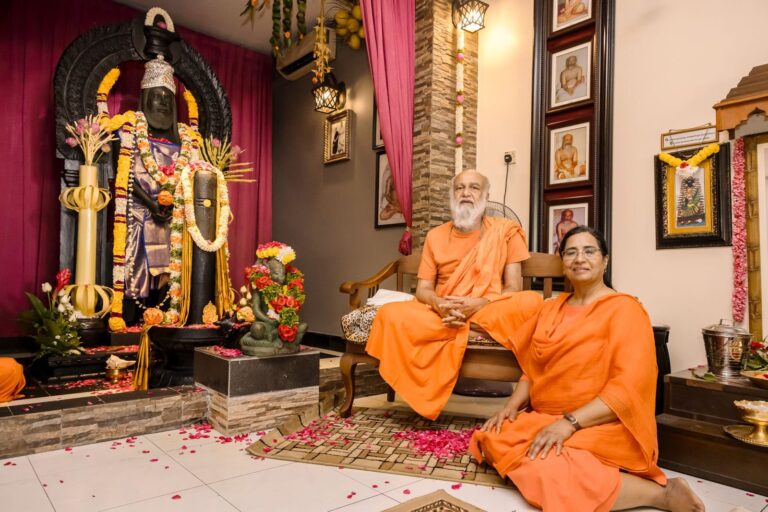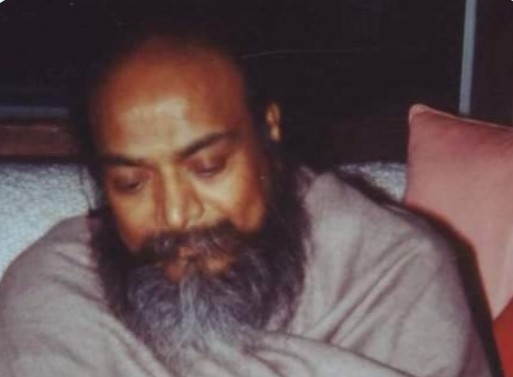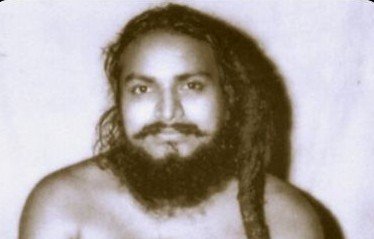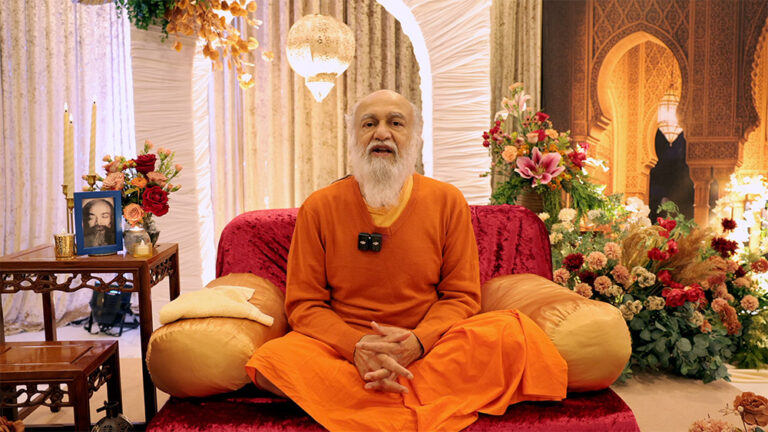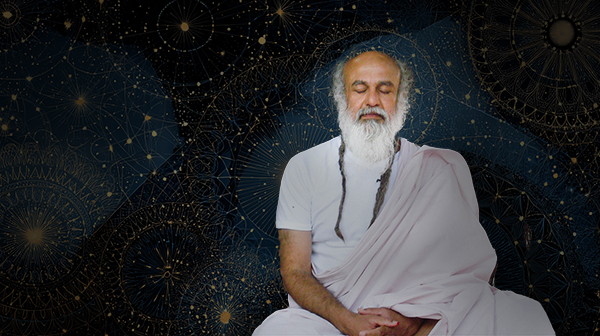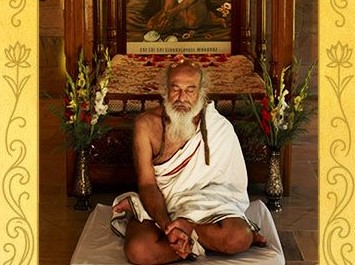Perth – 4th Oct 2006
Brahmanandam Paramasukadam
Kevalam Jnanamurtim
Dvandvaateetam Gaganasadrisham
Tattvamasyadi Laksiyam
Ekam Nityam Vimalam Achalam
Sarvadhi Sakshi Bhutam
Bhava Teetam Triguna Rahitam
Sadgurum Tvam Namami
It is so nice to be back with you all. Teaching here in this community has always been a very happy experience – your hospitality is so kind and you appreciate the teachings. I would offer my prostrations with deep love and reverence to my Guru, Shivabalayogi.
I have been teaching all over the world these several years, and this year a question has come up – it is asked respectfully, as the people simply want to know.
“What is aarati and why is it performed?”
With all the care I try to explain that aarati shows supreme reverence to someone to whom one has gone to learn. When I was growing up we learnt a motto, “Nothing is equal to Knowledge.” When you study, you gain knowledge and become a better person. So it is more valuable than all the gold and silver – you see, we don’t worship the goldsmith.
But imparting this knowledge and wisdom is not done on a business basis, where you buy it. It cannot happen that way. You have to show reverence; reverence is respect in a higher pitch. So you are here to gain this knowledge. No money is exchanged – this knowledge is given freely. Swamiji always said this. So when we do aarati it shows supreme reverence; “You are like God. You are my God.”
So like Kabir Das says in his famous song
“Guru Govinda Dono Khadhe
Kissake Lago Paye
Balehari Guru Apano
Govinda Diyo Bataye
Darshan Diyo Gharaaya“
‘The Guru and God are both standing in front of me.
To Whom should I first bow down to?
I shall bow down to the Guru first, because it the Guru who has shown me God.’
The word ‘Guru’ itself means ‘the dispeller of darkness’ – the dispeller of the darkness of ignorance. So we need respect to the Teacher and to the Knowledge; then we will be serious. So with this seriousness we get better concentration, and results start coming to you and you can live properly. This respect is important even in day-to-day life. When we behave, we show how we are; we need to cultivate this.
There are some new faces here and many have been before. Repeatedly hearing the knowledge from the Guru is not a bad thing. When we hear it the first time, the second time, the third time … it goes deeper into our mind. As you develop, the mind should become more settled, and understanding thus increases. For instance if you read a book, say if it is 300 pages, the first time you read it you might remember only a little of it. When you read it again and again, each time you learn new things.
So we were taught as children to behave – we learnt to speak to our elders respectfully, and so on. In our tradition we have the saying, “Mata, Pita, Guru, Devam” – ‘First Mother, then Father, then Guru and God’. So Mother and Parents are our first Gurus; God is actually last. I shall teach more of these things over the week.
Our meditation technique is referred to as ‘dhyana’. ‘Dhyana’ means “attention to”. If one is going to learn , we need to pay attention. If you are going to learn, your attention must be here – at least within these four walls. The mind’s attention can be distributed to various things; it is easily distracted. If the mind’s attention is not focused, then one cannot learn. In our tradition it is taught that one follow the teaching ‘Shravanam, Mananam, Nididhyasanam’ . ‘Shravanam’ means to listen with attention. ‘Mananam‘ means to keep it in the mind, to adopt the teaching into the mind. ‘Nididhyasanam’ means to practice the teachings so that the knowledge becomes yours.
So thus, these small things my parents taught when I was young – even today they are very vivid. They would say, “Don’t sit like that in front of your elders” and so on. Even today those instructions are very vivid in my mind. Thus when the Guru appeared in front of me at the beginning of my Tapas, He said, “Focus”, and so I focussed.
Also you need Faith. Even if the Guru tests you, you should have Faith – then you can pass the test. In those days with Swamiji – He didn’t teach in a structured way with lectures. Sometimes the teaching would suddenly come when we were sitting with Him – even late at night when we sat with Him. So when it came out it was such a beautiful thing – like a diamond or gold. So eventually I got those things we all want – Knowledge, Peace. All doubts were removed.

So ‘Attention – dhyana‘ is the first step. So just like your mind pays so much attention to the things of this world – in the same way when you address me, or perform aarati, it is not to this human body. To you, this body is an imagination of your mind, and just like in any form of worship we might use any symbol or idol – it might be made of wood or stone. The mind has a limited capacity; it might say, “Why worship this stone?” But a truly devoted person will know, “This is God.” In the same way, a true disciple will think, “This is God, Guru. He is that all-pervading Divine.”
So then our own attention gets broadened. If you learn to pay attention to yourself, then you can carry out other functions. You might be in the midst of war, in the midst of business or in a difficult spot, but none of these should give pain. The mind will be settled and can work out what is needed. Meditation will settle the mind and then you will clear confusions and become fearless. Then not for a second will you be unhappy; you will be the master of your mind. Then when you want to act, you can act and work in this world. When things happen, there is no stress. The mind is not troubled. Then there is no stress attached to the results; you simply put in efforts and see what will happen. Like a valiant soldier – he knows the result is not in his hands. He will simply do what he can and put in efforts.
So thus we teach this philosophy – learn to restrain the mind, and know the limits of this world. Put in efforts to achieve an end, but you will have to accept the results.
Now we will go for the initiation into the technique of meditation. It is called an ‘initiation’ because the Guru takes the initiative to inspire you to practice this and achieve.
‘If I have done it, you can also do it.’
The Guru blesses you and prays to God to inspire you and clear your doubts. You should never be shy to ask questions of the Guru. So in these programs, the talk is given to show the benefits of the meditation, the instructions are given and then we give a chance to ask questions about meditation, spirituality, behavior. So in the coming days we will talk more on these topics. If you think you need a better life, a better world for yourself – then give this your attention and come every day as though you are coming to a course, and ask questions if necessary. For this no charge is demanded – but we demand ‘Seriousness’ and ‘Attention’.
We deeply appreciate you all coming and being here for these programs.
Questions and Answers
Question:
If someone has a lot of physical pain in the body, it is distracting when trying to meditate.
Babaji:
If there is a physical ailment then one should take medical advice. In this technique there are no prescribed physical exercises. Medical advice might prescribe some exercise that might help.
The posture for meditation is that one should be sitting with the neck and head in a straight line. Focus your attention at the point in between the eyebrows, or at the front portion. Do not force – politely and firmly bring the attention there.
Question:
When people start this technique they often seem to think they can’t do it. Why is that?
Babaji:
Anything we start – anything is difficult. We need to think, “I can do it”.
If we think we can do it – then we can do it.
If we think we cannot do it – then we cannot do it.
In my childhood, my parents and teachers taught us to be positive. If we have this positive thinking, then we can start to face the issues.
Question:
With meditation, I’ve been taught to focus on something like a candle or thinking of a meaningless sound. This technique is different.
Babaji:
If one focuses on a candle it can be damaging to the eyes and make it difficult to concentrate also – so one needs to be careful in such things.
When one closes the eyes, then one can concentrate more easily and can become aware of your true Self.
Question:
Is there a danger with the eyes closed, that one will fall asleep?
Babaji:
If one has just eaten or one is too tired, then it can be difficult. So one should take a light diet and proper exercise to avoid this. It is important not to fall asleep. If one falls asleep then one loses consciousness and cannot focus.
Question:
You said one should ‘withdraw the mind’. What does that mean?
Babaji:
When the mind becomes concentrated, then it withdraws from the objects of the senses. It will not come on such an outside object as it becomes concentrated on itself. This state of awareness of the Self is called ‘dhyana‘. Real ‘dhyana‘ is when one becomes aware of your Self. The mind doesn’t jump out into this world.
Question:
Which part of the body is ‘the mind’? Is it just a bundle of thoughts?
Babaji:
Yes. It is just a bundle of thoughts. It is not in any one place. Thus when we clear all the thoughts, then we have pure Awareness.
Question:
In advanced states of meditation does the mind leave the body? People sometimes talk of astral travelling.
Babaji:
These things are really not important. One will lose consciousness of the body and become aware of the Existence of the Supreme Self. One may have experiences of travelling but ultimately they are found to be hallucinations.
The soul is not a piece of something here and there. It is all-pervading. Like with an earthen pot – for some time it appears that the space is in the pot – but ‘Space’ is everywhere. We start with this imagination of being in this body. Then with meditation we lose the consciousness of being in the body or out.
Question:
You have spoken earlier of ‘necessary things’ and ‘unnecessary things’. Can You please speak more about that?
Babaji:
You will have a way of life. For instance you need to work – but what is unnecessary is anxiousness, confusion. Like on a battlefield, what is unnecessary is anxiousness and confusion. What is necessary is to act well. The mind likes to brood on the past or be anxious about the future. These are unnecessary.
Gradually as we practice meditation, we gain more control over the mind. When we need to think, we can think. When there is no need to think then we can bring the mind back and rest it.
So some people complain they have worries and difficulties. This is unnecessary. But if you work and plan and put in efforts, then you can discriminate and see what is necessary.
Question:
You say that the Soul is ‘all-pervading’. So when one gets to that stage, do you experience yourself in every atom? Do you experience the suffering in everyone?
Babaji:
You experience the Soul – the suffering is an imagination.
So on the battlefield, a coward experiences fear and suffering. The brave soldier fights – whether he wins or loses. The difference is in the mind’s imaginations.
A Yogi is in a supremely peaceful state; He does not experience sufferings.
Copyright © 2006 SRBY, All rights reserved

